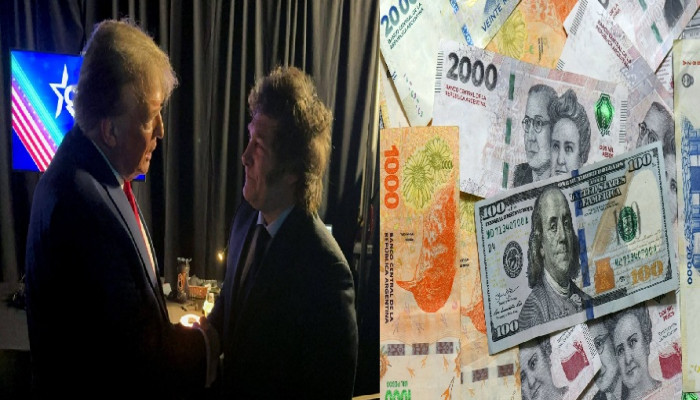Dollar Diplomacy: Trump Dangles Economic Aid to Sway Argentina
- In Military & Strategic Affairs
- 12:12 PM, Oct 30, 2025
- Ramaharitha Pusarla
With his tariff ‘magic bullet’, Trump has irked both friend and foe alike. Fearing American wrath, traditional American allies- Japan and South Korea, the EU and export-oriented economies- sealed trade deals pledging investments for lower tariffs. China, the largest trade partner of the US, with a huge trade surplus in its favour, had dug in its heels. The US-China trade war can be traced back to Trump’s first term, when the US levied retaliatory tariffs citing unfair trade practices and intellectual theft. China retaliated with its own tariffs. Following the escalations in 2019, countries signed the Phase 1 trade deal in 2020, and those tariffs remained in place until Trump’s second inauguration in 2025.
In addition to the sweeping tariffs on all trading partners, Trump announced ‘fentanyl’ tariffs on China in the second term. After an initial phase of escalation, intransigence, tariff readjustments and Trump’s TACOs, countries agreed for a three-month period, which is set to expire on November 9. Since Trump’s first term, China’s economic heft, influence, and global presence have increased manifold. Trump Liberation Day tariffs announced on April 2 stated, “protecting sovereignty and strengthening economic and national security” as the rationale and declared, “foreign trade and economic practices have created a national emergency”. While the blanket tariffs on countries are an attempt to leverage trade, the primary target of Trump was China.
Gearing up for a coercive trade war, Beijing bolstered its trade levers in the past seven years. Strategically working on weaknesses, Beijing has readied itself to beat the US at its own game. Besides building scientific and technological prowess, China began dissuading third countries from siding with the US. Pushing the envelope further, China has deepened its influence in America’s strategic backyard, Latin America and the Caribbean. Although Trump has escalated the trade war, he is critically aware that coercive tariffs alone are too insignificant to challenge the growing Beijing economic and geopolitical heft.
With zero imports of US soybeans, citing high tariffs for the first time in seven years, in a show of power and confidence, China hit back at the US. Last year, China purchased nearly half of the entire soybean exports worth $12.5 billion or 27 million metric tonnes. The total soybean exports of the US are worth $24.5 billion. This year, China dumped the US farmers and imported soybeans from Argentina and Brazil. This left US stunned. Soybean imports from Brazil rose 29.9% and those from Argentina jumped 91.5%.
China’s tit for tat move underscored its ability to inflict serious damage to the US economy. With one move, Beijing turned American farmers against Trump and demonstrated its ability to strategically source agricultural imports from third parties at will.
In early 2023, Argentina was invited to join BRICS along with five other countries- Egypt, Ethiopia, Iran, Saudi Arabia and the UAE. However, Javier Milei, who stormed into power in the 2023 Presidential election, declined to join the BRICS, reflecting a pro-Western foreign policy shift. During his election campaign, Milei dismissed any “business with communists” and maintained that he wouldn’t maintain diplomatic ties with China. Months into power, with economic realism dawning, Milei accepted the renewal of the currency swap with China in 2024 to repay $5billion debt. In November 2024, Milei met President Xi at the Brazil G20 summit and held talks with him.
Taking over the presidency, Milei, a libertarian economist, faced the insurmountable challenge of taming the bloating inflation and rescuing the sinking economy. Milei's austerity measures proved effective. The economy showed signs of recovery inflation came down to 100% as of December 2024 from 300%. However, by February 2025, a financial scandal unfolded after eight crypto wallets withdrew $99 million from the liquidity pool of the $LIBRA token promoted by Milei, undermining his credibility. Meanwhile, his austerity measures triggered protests. The initial temporary shocks of the devaluation of the Peso and the ‘crawling peg’ strategy of controlling inflation temporarily stabilised the economy. In the absence of comprehensive structural reforms, this failed to translate into sustainable growth. Consequently, to replenish depleting forex reserves, Milei sought $ 20 billion IMF bailout.
Since 1958, Argentina has received 22 IMF bailouts, mostly to repay the IMF itself. Argentina owes $44 billion to the IMF, and the institution, though wary, has finally approved a bailout thanks to the potential claims of “Milei Miracle” in April. Argentina is the largest borrower of IMF bailouts. However, two months ahead of the legislative elections on October 26, the Peso has collapsed, posing a serious threat to Milei’s regime. Milei, who aligns closely with MAGA, has rushed to Washington. Trump more obligingly authorised $20 billion aid package, proposing to double it if Milei wins the legislative elections, warning, “If he loses, we are not going to be generous with Argentina.”
Milei swept the mid-term election, and the US will now extend a $40 billion aid package ($20 billion currency swap plus $20 billion aid from sovereign wealth funds and private banks). Amid uproar from both aisles—betrayed American farmers, who deemed the financial aid to a competitor as awkwardly contradictory to “America First Agenda,” and Democrats attempted to unanimously pass “No Argentina Bailout Act,” Trump approved the bailout plan. Notwithstanding the backlash from the Republican MAGA camp and political opponents, Trump announced plans to import Argentinian beef as well.
Stating aid to Argentina “is not election-specific, it is policy-specific”, while presenting the Atlantic Council’s Global Citizen Award to President Javier Milei, Bessent let the cat out of the bag. He insisted that the package is part of the “economic Monroe Doctrine” of asserting the United States’ domination in the Western Hemisphere. Trump’s strategic intervention in Argentina stems from burgeoning Chinese influence in its backyard.
Argentina and China signed a Belt and Road Initiative cooperation plan in 2023 with a focus on infrastructure, energy and industrial development. With the acquisition of 80% stakes in Standard Bank of Argentina, China steadily increased its footprint in the country through subnational agreements. Given the strong federal character of Argentina, where provinces have direct control over resources, by passing the national government, Beijing is directly signing agreements with provincial governments- copper mining (Catamarca province), Potassium mining (Buenos Aires, Salta provinces), coal mining (La Pampa Province), Lithium (Jujay, Catamarca, Salta provinces), gold and silver mining (San Juan province). China is also actively engaged in constructing hydroelectric power plants, solar park, fourth nuclear power plant, Atucha III, aerospace base in Neuquen in Argentina. The telecommunications network in Argentina is now dominated by Huawei, banned by Western countries over national security issues.
China is also the top destination of Argentinian beef, which makes up over 50 per cent of the country’s exports. In September, availing Argentina’s suspended export tax window increased soybean imports from Argentina, stirring a domestic storm in America. China has emerged as a vital partner for Argentina on an equal footing with the US.
Countries first signed a currency swap agreement in 2009. Over the years, it was extended to $18.3 billion (130 billion yuan), including the latest renewal agreement of $5 billion in April 2025. Bessent travelled to Argentina to stall the renewal and threatened to withhold $20 billion Extended Fund Facility (EFF), an arrangement with the US since 1958. Later, Trump’s Latin America envoy said that the US wants Argentina to end its currency swap with China at a conference. In response, China shot back, saying China’s currency swap contributes to “Argentina’s economic and financial stability and is welcomed by the Argentine government”. The currency swap enabled Argentina to convert yuan into dollars to repay debts.
The Currency swap served twin purposes for China in terms of deepening its involvement in the Argentinian economy and promoting international use of the yuan, elevating its global stature and chipping countries away from dollar dominance.
Unambiguously admitting Washington’s concerns over China’s deepening economic engagement with Argentina, Bessent stated that the US didn’t want Latin American countries to confer mining rights of rare earths for financial aid, as it has happened in Africa. Latin American countries are sitting on a huge pile of critical minerals.
Having monopolised the global supply of critical minerals, tightly regulating their exports, Beijing leveraged them against the US in this ongoing tariff war. Indispensable for chips, EVs, automobiles and renewable energy, a critical shortfall can paralyse the US defence and other allied sectors. To reduce reliance on China, Trump has frantically inked critical mineral framework agreements with Australia, Cambodia, Malaysia, Thailand and Japan. Trump even wooed Pakistan for mineral exploration and mining projects.
Contending with a declining American hegemony, the Trump administration is focused on building domestic stability and reasserting the US dominance in the Western Hemisphere. China’s growing economic power, with ambitions of reshaping the World order, poses an imminent challenge to US unipolarity. Beijing is now an economic and geopolitical risk for the United States. Trump’s economic package for Argentina is an attempt to win an ally in the region and wean it away from the Chinese orbit. The huge rare-earth stockpile is a huge bonus which Trump refuses to let go of, even at the cost of angering its MAGA camp.
Trump’s geopolitical manoeuvring signals a renewed U.S. push to reclaim influence in Latin America. Washington appears to be deploying every tool at its disposal to reassert dominance in the Western Hemisphere. Under the pretext of combating drug trafficking, Trump has ramped up pressure on Venezuela, while simultaneously signalling a willingness to revisit tariffs on Brazil—even as the Senate moves to block them. Though whispers of a neocolonial plan remain speculative, Trump’s aggressive interventions in the region make such concerns hard to dismiss.
References
- https://www.businesstoday.com.my/2025/10/21/china-skips-us-soybeans-in-september-as-south-american-imports-surge/
- https://buenosairesherald.com/economics/argentina-renews-us5-billion-currency-swap-with-china-for-12-months
- https://dialogue.earth/en/business/argentinas-provinces-deepen-relations-with-china/
- https://buenosairesherald.com/economics/argentina-renews-us5-billion-currency-swap-with-china-for-12-months
- https://www.politico.com/news/magazine/2025/10/24/argentina-deserves-its-bailout-00620337
Disclaimer: The opinions expressed within this article are the personal opinions of the author. MyIndMakers is not responsible for the accuracy, completeness, suitability, or validity of any information on this article. All information is provided on an as-is basis. The information, facts or opinions appearing in the article do not reflect the views of MyindMakers and it does not assume any responsibility or liability for the same.







Comments